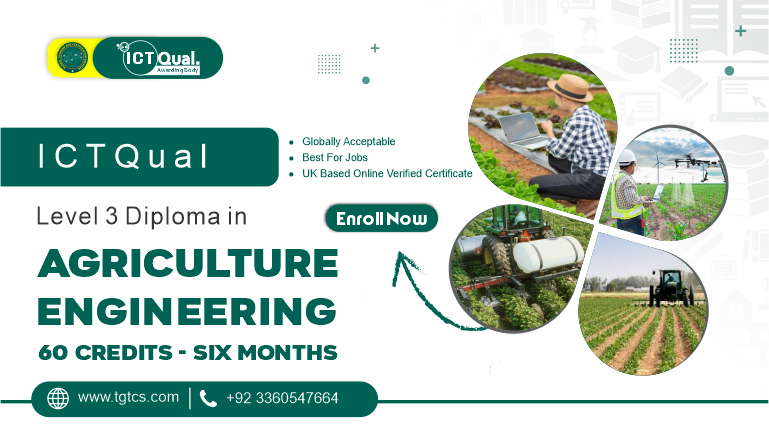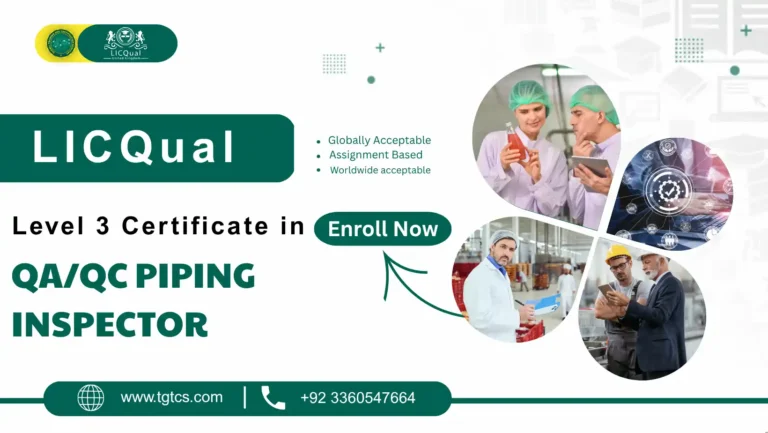ICTQual Level 3 Diploma in Agriculture Engineering 60 Credits – 6 Months
The ICTQual Level 3 Diploma in Agricultural Engineering is the ideal qualification for you! With 60 credits and a course duration of just 6 months, this diploma offers a fast-track route to success in a thriving industry.
The ICTQual Level 3 Diploma in Agricultural Engineering is a vocational qualification designed to equip learners with the knowledge and skills necessary to work in agricultural engineering roles. The qualification focuses on both practical and theoretical aspects of agricultural machinery and technology. By completing this diploma, you’ll gain expertise in the operation, maintenance, and repair of agricultural equipment, along with an understanding of how agricultural systems work.
The ICTQual Level 3 Diploma in Agricultural Engineering offers an excellent opportunity to jumpstart your career in the rapidly evolving agricultural sector. With a focus on practical skills, industry-relevant knowledge, and a quick 6-month timeline, this qualification provides the perfect balance of learning and application. Whether you’re a school leaver, a farmer looking to upskill, or someone eager to enter the agricultural technology field, this diploma is the stepping stone you need to succeed.
The Global Training and Certification Services (TGTCS) is Directly Approved Training Centre of ICTQual
The ICTQual Level 3 Diploma in Agricultural Engineering is a comprehensive vocational qualification designed to equip learners with essential skills for the agricultural engineering sector. Offering 60 credits and a fast-track 6-month duration, this course provides practical knowledge in machinery operation, maintenance, energy systems, and agricultural safety. It’s ideal for school leavers, agricultural workers, or anyone interested in advancing their career in the field.
Upon completion, students can pursue careers such as agricultural engineer, machinery technician, or farm manager. This qualification is recognized by employers, ensuring students are well-prepared for a successful career in agricultural engineering.
Mandatory Units
The Units of Level 3 Diploma in Agriculture Engineering 60 Credits – 6 Months are as ;
- Introduction to Agriculture Engineering
- Farm Machinery and Equipment
- Irrigation Systems and Water Management
- Soil Science and Crop Management
- Renewable Energy in Agriculture
- Agricultural Project Planning and Management
Learning Outcomes for the Level 3 Diploma in Agriculture Engineering are as :
Introduction to Agricultural Engineering
Upon completing this unit, learners will:
- Understand the role and scope of agricultural engineering in modern farming practices.
- Identify key components of agricultural systems and how they interact.
- Explain the importance of sustainability in agriculture.
- Demonstrate knowledge of basic agricultural technologies and their applications.
Farm Machinery and Equipment
Upon completing this unit, learners will:
- Recognize different types of farm machinery and their specific functions.
- Perform routine maintenance and minor repairs on agricultural equipment.
- Apply safety standards and protocols when operating machinery.
- Assess the impact of mechanization and automation on productivity and efficiency.
Irrigation Systems and Water Management
Upon completing this unit, learners will:
- Understand the principles and importance of effective water management in agriculture.
- Differentiate between various types of irrigation systems and their applications.
- Install and maintain irrigation systems for optimal performance.
- Develop strategies for sustainable and efficient water use.
Soil Science and Crop Management
Upon completing this unit, learners will:
- Assess soil properties to determine suitability for different crops.
- Apply techniques for soil testing and improving fertility.
- Design crop rotation and pest management strategies.
- Solve challenges in crop production with innovative approaches.
Renewable Energy in Agriculture
Upon completing this unit, learners will:
- Understand the role of renewable energy in improving agricultural sustainability.
- Identify and assess solar, wind, and biomass energy systems for use on farms.
- Implement energy-efficient practices for agricultural operations.
- Analyze the economic and environmental impacts of adopting renewable energy.
Agricultural Project Planning and Management
Upon completing this unit, learners will:
- Develop detailed plans for agricultural projects, including resource allocation.
- Manage budgets and timelines effectively to ensure project success.
- Identify and mitigate risks related to farming operations.
- Assess the outcomes of agricultural projects for sustainability and scalability.
The Course Benefits of Level 3 Diploma in Agriculture Engineering 60 Credits – 6 Months are as :
The ICTQual Level 3 Diploma in Agriculture Engineering is a comprehensive qualification that equips learners with the essential skills and knowledge required to thrive in the dynamic and ever-evolving agricultural engineering sector. Here are the key benefits of undertaking this course:
1. Specialized Technical Skills
- Advanced Agricultural Machinery Knowledge: Gain a deep understanding of the design, operation, and maintenance of machinery used in modern farming, including tractors, harvesters, and irrigation systems.
- Engineering Problem-Solving Skills: Develop critical thinking and problem-solving skills, essential for troubleshooting and resolving technical issues in agricultural machinery and equipment.
- Hands-on Practical Training: Practical modules provide real-world experience, enabling you to work with cutting-edge agricultural technology and equipment, ensuring that you are job-ready.
2. Industry-Relevant Curriculum
- Current Industry Trends: The course content is continuously updated to reflect the latest trends and innovations in agricultural engineering, such as precision farming, automation, and sustainable practices.
- Wide Range of Topics: Explore a diverse range of subjects, including mechanical systems, electrical and hydraulic systems, CAD (Computer-Aided Design) for agricultural machinery, and environmental sustainability.
3. Enhanced Career Opportunities
- In-Demand Skills: Agriculture and engineering are vital sectors globally, and this qualification ensures you are well-equipped for roles in both fields, boosting your employability.
- Multiple Career Paths: With this diploma, you can pursue various career options, such as agricultural machinery technician, farm equipment specialist, maintenance engineer, or even research and development roles in agricultural technologies.
- High Job Security: Agriculture is a foundational industry, and with the ongoing demand for innovation in machinery and processes, professionals in agricultural engineering are consistently in demand.
4. Support for Further Education and Career Growth
- Pathway to Higher Qualifications: This qualification provides a solid foundation for those wishing to pursue higher education or professional qualifications in agricultural engineering, mechanical engineering, or related fields.
- Professional Development: The diploma also provides a platform for continuous learning and development, keeping you updated with the latest industry advancements and regulations.
5. Sustainability and Environmental Awareness
- Sustainable Engineering Practices: Learn about the importance of sustainability in agricultural practices, such as energy-efficient machinery, water management systems, and low-impact farming technologies.
- Contribution to Global Agricultural Challenges: This qualification enables you to play an active role in addressing global issues like food security, climate change, and resource conservation through innovative engineering solutions.
6. Job Flexibility and Mobility
- Work Across Diverse Settings: Whether on farms, with agricultural machinery manufacturers, or in research and development labs, this diploma opens up a variety of working environments.
- International Opportunities: As agricultural practices are universal, this qualification is recognized internationally, offering you the flexibility to pursue career opportunities abroad.
7. Develop Soft Skills and Professional Attributes
- Teamwork and Communication: The course fosters teamwork and the ability to communicate complex technical information effectively, crucial skills for working in multidisciplinary teams and with clients.
- Time Management and Organization: Gain experience managing projects and meeting deadlines, enhancing your ability to work efficiently and productively in fast-paced environments.
The ICTQual Level 3 Diploma in Agriculture Engineering is designed for individuals with a keen interest in both agriculture and engineering. It is ideal for learners who are eager to develop practical skills and theoretical knowledge in agricultural machinery and technology. Below are the key characteristics and qualities of the ideal learner for this qualification:
1. Interest in Agriculture and Engineering
- The ideal learner has a strong passion for agriculture and is curious about how engineering can improve farming practices.
- They enjoy working with machinery and technology, and are motivated to learn about the tools that are crucial to modern farming operations.
- A fascination with how technological advancements in machinery, automation, and sustainability can transform the agricultural industry is key.
2. Practical, Hands-on Learner
- The course is highly practical, so the ideal learner is someone who enjoys hands-on activities, such as working with tools and machinery, troubleshooting problems, and applying their knowledge in real-world settings.
- They enjoy learning through practical application, gaining experience in workshops, laboratories, and potentially on-site work placements.
3. Problem-Solver with Analytical Skills
- The ideal learner possesses strong problem-solving skills, as they will be expected to diagnose, repair, and optimize agricultural equipment and machinery.
- They are analytical, able to break down complex technical issues and think critically about potential solutions.
4. Attention to Detail and Precision
- Agricultural engineering requires a high level of precision. The ideal learner is meticulous and detail-oriented, especially when working with machinery and technology that demands careful calibration and maintenance.
- They understand the importance of accurate measurements and adjustments to ensure the safe and efficient operation of agricultural equipment.
5. Technologically Inclined
- An interest in technology and innovation is essential. The ideal learner is comfortable with or eager to learn about modern agricultural technologies such as automation, GPS systems, sensors, and data-driven farming tools.
- They are open to using digital tools, such as CAD (Computer-Aided Design), for machinery design and are ready to embrace technological advancements in the agricultural industry.
6. Team-Oriented and Collaborative
- While independent work is important, the ideal learner is also a good team player who can collaborate effectively with colleagues, farmers, technicians, and engineers.
- They are able to communicate complex technical concepts clearly and work with others to achieve common goals, whether that’s diagnosing an issue with machinery or developing new farming solutions.
7. Strong Work Ethic and Motivation
- The course requires commitment and discipline, and the ideal learner has a strong work ethic, managing their time effectively and completing tasks and projects to a high standard.
- They are self-motivated and driven to complete the course and pursue further opportunities in agricultural engineering, whether through work experience, higher education, or professional qualifications.
8. Aspiring to Make a Positive Impact
- The ideal learner is not only interested in pursuing a career in agricultural engineering but also in contributing to the sustainability and efficiency of agricultural practices.
- They are passionate about using engineering solutions to address global challenges, such as climate change, food security, and sustainable farming practices.
9. Previous Experience or Foundation in Science/Maths (Beneficial but Not Essential)
- While not a strict requirement, learners with a background in science, technology, engineering, or mathematics (STEM) subjects will find the technical aspects of the course more accessible.
- Those with prior experience or knowledge of basic agricultural practices or mechanical systems will be better positioned to grasp advanced topics, though the course is designed to cater to a range of experience levels.
10. Ready for Career Advancement or Further Studies
- The ideal learner sees this diploma as a stepping stone to a rewarding career in agricultural engineering, with the potential to progress into roles such as agricultural machinery technician, farm equipment engineer, or R&D specialist.
- They are also open to further study or professional development to deepen their expertise in agricultural engineering or related fields.
Progression Routes
Completing the ICTQual Level 3 Diploma in Agricultural Engineering opens up a wide range of academic and career progression opportunities. This qualification lays a strong foundation for learners to advance in both education and their professional journey. Below are some potential pathways for growth:
Further Education
Graduates of the Level 3 Diploma have the opportunity to pursue higher qualifications to expand their knowledge and specialize further in agriculture and engineering:
- Level 4 Diploma in Agricultural Engineering: A more advanced qualification, focusing on specialized technical skills and knowledge.
- Higher National Diploma (HND) in Agriculture or Agricultural Engineering: Ideal for those looking to combine academic theory with practical, hands-on experience.
- Bachelor’s Degree in Agricultural Engineering or Related Fields: A pathway to comprehensive university-level study, covering areas such as sustainable farming, precision agriculture, agro-mechanical engineering, and more.
Career Opportunities
The skills acquired in this diploma are highly valued in the agricultural sector, opening doors to a variety of career options, such as:
- Agricultural Machinery Technician: Specializing in the maintenance, repair, and optimization of agricultural machinery.
- Irrigation Systems Specialist: Designing, implementing, and maintaining efficient irrigation systems to maximize water usage on farms.
- Farm Operations Manager: Managing day-to-day farm operations, including crop production, machinery maintenance, and resource management.
- Sustainability Consultant: Advising agricultural businesses on eco-friendly practices, renewable energy solutions, and sustainable farming methods.
- Agricultural Project Coordinator: Overseeing and managing agricultural projects, from planning to implementation.
Entrepreneurship Opportunities
With the knowledge gained, graduates can also explore self-employment opportunities, such as:
- Starting a Modern Farm: Applying engineering principles to run a farm that uses the latest machinery and sustainable practices.
- Consultancy Services: Offering expertise in farm machinery maintenance, irrigation systems, or agricultural technology solutions.
- Renewable Energy Solutions: Developing and implementing renewable energy systems tailored to agricultural needs, such as solar-powered irrigation or wind energy for farming operations.
Professional Certifications
Graduates may also choose to enhance their qualifications through specialized certifications, including:
- Farm Equipment Maintenance and Operation: Gaining official recognition for expertise in maintaining and operating various types of farm machinery.
- Irrigation and Water Management: Earning certifications that demonstrate proficiency in modern irrigation techniques and efficient water use on farms.
- Renewable Energy Systems for Agriculture: Specializing in the application of renewable energy technologies in agricultural settings, such as solar and wind-powered systems for farms.
By completing the ICTQual Level 3 Diploma in Agricultural Engineering, learners are not only prepared for immediate career opportunities but also well-positioned for ongoing academic and professional growth within the agriculture and engineering industries.
Course Overview
Course Level
Level 3
Course Units
06 Mandatory Units
Duration
6 Months






